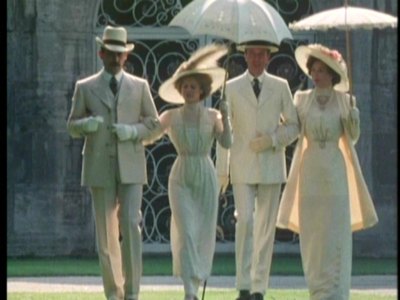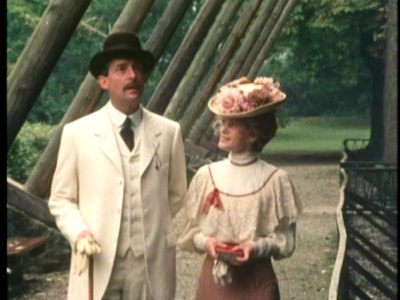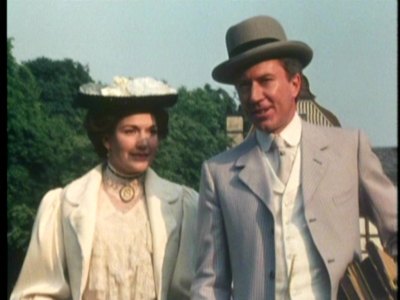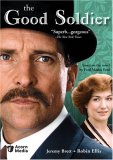| Reviews & Columns |
|
Reviews DVD TV on DVD Blu-ray 4K UHD International DVDs In Theaters Reviews by Studio Video Games Features Collector Series DVDs Easter Egg Database Interviews DVD Talk Radio Feature Articles Columns Anime Talk DVD Savant Horror DVDs The M.O.D. Squad Art House HD Talk Silent DVD
|
DVD Talk Forum |
|
|
| Resources |
|
DVD Price Search Customer Service #'s RCE Info Links |
|
Columns
|
|
|
Good Soldier, The
An intriguing, elliptical puzzle of a film, The Good Soldier, a 1981 Granada Television adaptation of author Ford Madox Ford's best known work, nicely captures the complicated flash-forward/flash-back, impressionistic literary style that Ford pioneered, while delivering some interesting performances in this tale of rich, duplicitous couples who lie to themselves and each other during the years just prior to World War I. Starring Jeremy Brett, Robin Ellis, Susan Fleetwood, and Vickery Turner, The Good Soldier lends itself well to the Ford's cinematic literary style, coming out as one of the better Masterpiece Theatre imports.

The Good Soldier tells the story of two extremely wealthy couples: Britishers Captain Edward Ashburnham and his wife Leonora, and Americans John Dowell and his wife Florence. Both are visiting a health spa in Nauheim, Germany. John Dowell, the narrator of the story, relates how his wife, Florence, developed a bad heart crossing the ocean, which has effectively stranded them on the European continent. Unable to visit England (their original destination), both flit back and forth between France, Italy and Germany, taking in each country's sites and restorative spas as the seasons dictate. The Ashburnhams, from England's upper class, are visiting Nauheim for Captain Edward's heart. What starts off as an innocent meeting between two ill-suited couples (the Ashburnhams look upon the Dowell's as their economic equals, but their social inferiors) turns into a nine year friendship that reveals shocking secrets about each member of the group.
SPOILERS
It's almost impossible to discuss The Good Soldier's plot in any kind of detail - without spoiling the film's surprises -- because of the elliptical nature of Ford's story structure. Seemingly incoherent information is doled out and left unexplained throughout the film, with vital clues given boldly at the beginning of the story that only make sense as the film progresses. So...I won't give away too much; it's too good a film to do that to you. What does fascinate in The Good Soldier is the myriad permutations of the various emotional relationships that spring up between the two couples, and the notions of power, class, sex, lies and secrecy that boil underneath seemingly placid, perfect exteriors. Ford, commenting on the inevitable disappearance of a rarified, genteel way of life for wealthy Europeans, with the coming of World War I, uses the "perfect" couple, the Ashburnhams, to illustrate the hypocrisies of the upper classes he had observed first hand. Edward, the "good soldier" who presents a model image of the Victorian gentleman warrior, is in fact, due to his flagrant philandering and ill-advised financial ventures, no better than the supposedly "lower orders" he so obviously despises. Leonora, the epitome of the demure Victorian wife in public, is in reality a controlling, vengeful harridan who manages what little money the Ashburnhams still have after Edward's misadventures, and who wishes to destroy Edward for his myriad infidelities and her subsequent humiliations.

The performances in The Good Soldier are exceedingly good. Jeremy Brett and Susan Fleetwood are impressive in difficult roles, particularly Fleetwood who must alternate from frosty Victorian prude to outraged, passionate wife, to cold, calculating destroyer. Vickery Turner succeeds in making Florence incredibly annoying and abrasive, and Robin Ellis strikes just the right mysterious note for John, who winds up having no substance behind that elusive mystery. The only trouble with the casting I had was John Ratzenberger (yes, Cliffy from Cheers) in a pivotal role as Jimmy, the former male nurse to Florence and her family. The screenplay lets down this particular character, giving him only one scene to establish his later importance to the story. So the actor who plays Jimmy must have a certain presence to keep the character's significance in viewers' minds. Unfortunately, Ratzenberger fails to make much of an impression, and quite honestly, when his character was referred to later in the film, at a crucial plot revelation, I had to think a minute about whom they were speaking.
The direction by Kevin Billington, of the adaptation by Julian Mitchell, gets Ford's cinematic literary style down pat, with jarring jump cuts and incoherent flashbacks and flashforwards which gradually make sense over the course of the film. It's an intriguing, beguiling technique that compares favorably to Ford's writing, and it enlivens what could have been an overly familiar storyline. It's just a shame that the original materials used for this DVD transfer were so obviously degraded. What looked to be a beautiful, sumptuous production, is quite scratched and faded here - although that does give one the opportunity to focus more on the acting and the script.

The DVD:
The Video:
As I stated above, the original elements used for this DVD transfer of The Good Soldier are not exactly optimal ones. The full screen video image is rather faded, with quite a few scratches and print anomalies, with some scenes soft in focus, as well.
The Audio:
The Dolby Digital English mono soundtrack is adequate for this dialogue-driven film. There are no subtitles or close-captioning options.
The Extras:
There are text filmographies for the lead actors, and a text bio for Ford Madox Ford.
Final Thoughts:
Having read The Good Soldier prior to seeing the film, I was most impressed by not only the fidelity of this adaptation to the original source, but also The Good Soldier's faithful cinematic approximation of Ford's literary style. A seemingly genteel story about the rich and leisured class evolves into a telling and revelatory examination of morality and human frailty. I recommend The Good Soldier.
Paul Mavis is an internationally published film and television historian, a member of the Online Film Critics Society, and the author of The Espionage Filmography.


|
| Popular Reviews |
| Sponsored Links |
|
|
| Sponsored Links |
|
|
| Release List | Reviews | Shop | Newsletter | Forum | DVD Giveaways | Blu-Ray | Advertise |
|
Copyright 2024 DVDTalk.com All Rights Reserved. Legal Info, Privacy Policy, Terms of Use,
Manage Preferences,
Your Privacy Choices | |||||||













